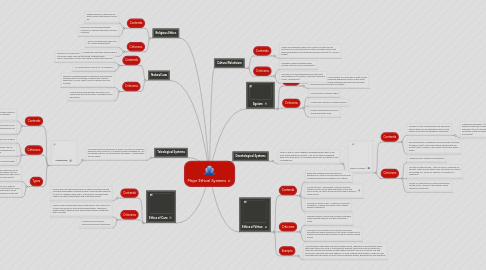
1. Ethics of Care
1.1. Contends
1.1.1. Defines good as meeting the needs of others and preserving and enriching relationships; feminine morality; natural human response to care for a newborn child, the ill, and the hurt; concerned with needs over rights (rehabilitation and restorative justice)
1.2. Criticisms
1.2.1. Women, who predominantly perform the work of care, often do so to their own economic and political disadvantage. Oppressed peoples tend to develop moral theories that reaffirm subservient traits as virtues
1.2.2. Counters feminist aims by reinforcing feminine stereotypes
2. Teleological Systems
2.1. Concerned with consequences or ends of an action to determine goodness. Even a bad act, if it results in good consequences, can be defined as good. The "end justifies the means." Pronunciation: Tell-ee-oligical
2.1.1. Utilitarianism
2.1.1.1. Contends
2.1.1.1.1. Greatest good is that which results in greatest happiness for greatest number
2.1.1.1.2. Good for society should prevail, despite wrong being done to an individual
2.1.1.2. Criticisms
2.1.1.2.1. All pleasures or benefits are not equal
2.1.1.2.2. System presumes one can predict the consequences of one's actions
2.1.1.2.3. Little concern for individual rights
2.1.1.3. Types
2.1.1.3.1. Act Utilitarianism: Determines goodness of a particular act by measuring the good for all, but only for that specific act and without regard for future actions (i.e., stealing food when one is hungry justified because outweighs loss for store owner)
2.1.1.3.2. Rule Utilitarianism: Determines the goodness of an actin by measuring the utility of that action when it is made into a rule for behaviour (i.e., if people stole food every time hungry, would contribute to a state of lawlessness and disrespect for the law)
3. Natural Law
3.1. Contends
3.1.1. Principles of morals and rights are inherent in nature and not human-made; laws are discovered. Originated with Stoics. Preservation of one's own being is natural (self-defense)
3.1.2. "An unjust law is no law at all" St. Augustine
3.2. Criticisms
3.2.1. Difficulty is identifying what is consistent and congruent with the natural inclinations of human-kind ("natural" superiority of races, sexes). Used to oppose same-sex marriage
3.2.2. How does one know whether the moral rule is based upon true natural law or a mistaken human perception?
4. Religious Ethics
4.1. Contends
4.1.1. Religious beliefs of good and evil; what is good is that which is God's will
4.1.2. Know God's will through individual conscience, religious authorities, and holy scriptures
4.2. Criticisms
4.2.1. How do we determine God's will? (vs. human interpretation)
4.2.2. Contradictory principles within religions
5. Egoism
5.1. Contends
5.1.1. Defines the pursuit of self-interest as a moral good. What is good for one's survival and personal happiness is moral. Adam Smith (capitalism) promoted this arguing pursing one's own personal good would lead to prosperous nations.
5.2. Criticisms
5.2.1. No recognition of others' rights
5.2.2. Violates basic tenets of an ethical system
5.2.3. Supports exploitative actions by strong against the weak
6. Ethics of Virtue
6.1. Contends
6.1.1. Bases ethics largely upon character and possession of virtues; one does good not because of reason but because of patterns of a lifetime
6.1.2. Socrates (virtue = knowledge), Plato and Aristotle (people choose, people have intellectual virtues and moral virtues, by nature we are good) all tried to define a "good person"
6.1.3. Principle of Golden Mean = Aristotle's concept of moderation, in which one should not err toward excess or deficiency
6.2. Criticisms
6.2.1. Different people, cultures and societies often have vastly different opinions on what constitutes a virtue.
6.2.2. Does not focus on what sorts of actions are morally permitted and which ones are not, but rather on what sort of qualities someone ought to foster in order to become a good person.
6.3. Example
6.3.1. A deontologist might argue that lying is always wrong, regardless of any potential "good" that might come from lying. A virtue ethicist, however, would focus less on lying in any particular instance and instead consider what a decision to tell a lie or not tell a lie said about one's character and moral behavior. As such, lying would be made in a case-by-case basis that would be based on factors such as personal benefit, group benefit, and intentions
7. Deontological Systems
7.1. Study of duty or moral obligation emphasizing the intent of the actor as the element of morality. If an act or intent is inherently good (from good will), it is considered good even if it results in bad consequences
7.1.1. Ethical Formalism
7.1.1.1. Contends
7.1.1.1.1. Focuses on duty; holds that the only thing truly good is good will, and that what is good is that which conforms to the categorical imperative
7.1.1.1.2. Absolutist system: something is wrong, wrong all the time (murder or lying) - would not support assassinating evil tyrants (Hitler, Hussein, or Bin Laden) as murder is always wrong
7.1.1.2. Criticisms
7.1.1.2.1. Unresponsive to extreme circumstances
7.1.1.2.2. Morality is limited by duty - duty for many is a baseline for morality. Duties are not always clear and duties can conflict one another (i.e., loyalty to a partner vs. honesty to a supervisor)
7.1.1.2.3. Priority is on the motive or intent of the person, not the result - difficult to tell people's "good intentions" sometimes
8. Cultural Relativism
8.1. Contends
8.1.1. Values and behaviours differ from culture to culture and are functional in the culture that holds them; considers "good" that which contributes to the health and survival of society (i.e., honour killings)
8.2. Criticisms
8.2.1. Prohibition against interfering with another culture's norms is problematic.
8.2.2. Not okay to do some things because they seem right at the time (Holocaust, Japanese Internment camps, Guantanamo)
